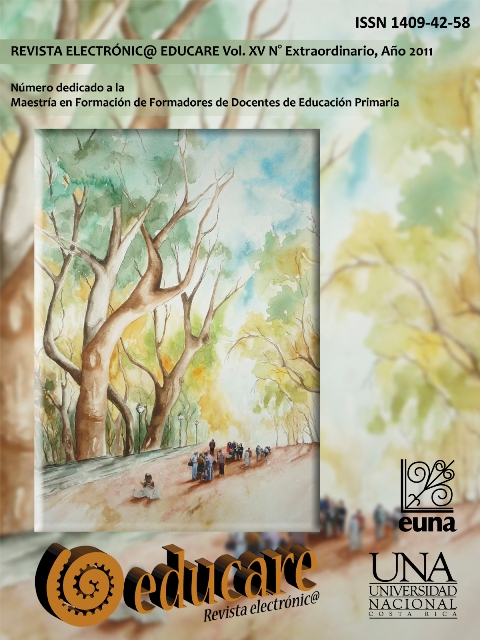A Pedagogical Strategy for Integrated Education of Spanish in the 4th to 6th Grades of the General Basic Education
DOI:
https://doi.org/10.15359/ree.15-Ext.2Keywords:
Pedagogical strategy, communicative approach, communication skills, integrated educationAbstract
Language teaching has become a priority in the Costa Rican educational system, considering it as a tool for communication and development of thought. Without language, there is no access to other curriculum disciplinary knowledge. A successful experience conducted some years ago, with students from 4th to 6th grade, was the basis for the design and implementation of a professional development activity addressed to promoting an integration strategy previously adjusted according to the Ministry’s requirements and the existing national regulations. This study is developed in the framework of a qualitative paradigm including research-action and systematization. A purposive sample was selected based on a suitability factor, through which individuals are informed about the strategy, and then the strategy is applied to a group of students from urban-marginal areas. The techniques used include literature review, analysis of curriculum and Ministry’s regulations, application of an in-depth interview, discussions from the course’s participant in a portfolio, and discussions from students to whom the strategy was applied. We analyzed the considerations of teachers and students, as well as the theoretical and regulatory information by triangulation. The study’s conclusion is the necessity of a communicative approach in language teaching and our recommendation is to implement the strategy developed in the Costa Rican classrooms as provided in this paper.
References
Alvarado, M. (2001). Enfoques en la enseñanza de la escritura. En M. Alvarado (Coord.), Entre
líneas. Teorías y enfoques en la enseñanza de la escritura, la gramática y la literatura (pp.
-54). Buenos Aires, Argentina: Ediciones Manantial.
Córdoba, P., Coto, R. y Ramírez, M. (2005, enero-junio). La comprensión auditiva: definición, importancia,
características, procesos, materiales y actividades. Revista Actualidades Investigativas
en Educación. (5)1, 1-17. Disponible en http://revista.inie.ucr.ac.cr/articulos/1-2005/articulos.php
Delmiro, B. (2002). La escritura creativa en las aulas. En torno a los talleres literarios. (Serie
didáctica de la lengua y de la literatura). Barcelona, España: Graó.
Hernández, R. M. (2007). Evaluación del aprendizaje significativo en el aula. Cuadernos para la
enseñanza del Español 2 (5ª reimp). San José, Costa Rica: EUNED.
Loaiza, O., Gaspar, M. (2001) Sobre la gramática. En M. Alvarado (Coord.), Entre líneas. Teorías
y enfoques en la enseñanza de la escritura, la gramática y la literatura (pp. 75-112). Buenos
Aires, Argentina: Ediciones Manantial.
Ministerio de Educación Pública. (2005). Español I y II ciclos. San José, Costa Rica: Autor.
Recuperado de https://sites.google.com/site/programasdeestudiomep/system/app/pages/search?q
=Espa%C3%B1ol&scope=search-site
Ministerio de Educación Pública. (2009). Compendio de normas reguladoras para el desarrollo
curricular. San José, Costa Rica: Autor.
Pang, E., Muaka, A., Bernhardt, E. y Kamil, M. (2006) En H. J. Walberg (Ed.), Serie Prácticas
educativas, 12. México: Academia Internacional de Educación y Oficina Internacional de
Educación.
Downloads
Published
How to Cite
Issue
Section
License
1. In case the submitted paper is accepted for publication, the author(s) FREELY, COSTLESS, EXCLUSIVELY AND FOR AN INDEFINITE TERM transfer copyrights and patrimonial rights to Universidad Nacional (UNA, Costa Rica). For more details check the Originality Statement and Copyright Transfer Agreement
2. REUTILIZATION RIGHTS: UNA authorizes authors to use, for any purpose (among them selfarchiving or autoarchiving) and to publish in the Internet in any electronic site, the paper´'s final version, both approved and published (post print), as long as it is done with a non commercial purpose, does not generate derivates without previous consentment and recognizes both publisher's name and authorship.
3. The submission and possible publication of the paper in the Educare Electronic Journal is ruled by the Journal’s editorial policies, the institutional rules of Universidad Nacional and the laws of the Republic of Costa Rica. Additionally, any possible difference of opinion or future dispute shall be settled in accordance with the mechanisms of Alternative Dispute Resolution and the Costa Rican Jurisdiction.
4. In all cases, it is understood that the opinions issued are those of the authors and do not necessarily reflect the position and opinion of Educare, CIDE or Universidad Nacional, Costa Rica. It is also understood that, in the exercise of academic freedom, the authors have carried out a rogorous scientific-academic process of research, reflection and argumentation thar lays within the thematic scope of interest of the Journal.
5. The papers published by Educare Electronic Journal use a Creative Commons License:















 The articles published by Educare Electronic Journal can be shared with a Creative Commons License:
The articles published by Educare Electronic Journal can be shared with a Creative Commons License: 



